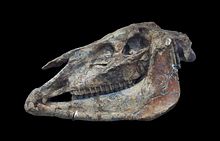Hippotherium
Appearance
| Hippotherium Temporal range: Middle to Late Miocene
| |
|---|---|

| |
| Skeleton of Hippotherium primigenium, Staatliches Museum für Naturkunde Stuttgart | |
| Scientific classification | |
| Domain: | Eukaryota |
| Kingdom: | Animalia |
| Phylum: | Chordata |
| Class: | Mammalia |
| Order: | Perissodactyla |
| Family: | Equidae |
| Subfamily: | Equinae |
| Tribe: | †Hipparionini |
| Genus: | †Hippotherium Kaup, 1832 |
| Species | |
| |
Hippotherium is an extinct genus of horse that lived in during the Miocene through Pliocene ~13.65—6.7 Mya, existing for 6.95 million years.
The last known surviving Hippotherium was H. malpassii, found in Italy.[1]
Species
[edit]




The type species, H. primigenium, is known from Miocene deposits in Europe (e.g., the Hegau region in southern Germany)[2] and the Middle East, while the species H. koenigswaldi and H. catalaunicum have been found in Miocene deposits in Spain.[citation needed] The Asian hipparionin "Hipparion" weihoense from early Late Miocene deposits in northern China has also been referred to the genus.[3]
Diet
[edit]H. primigenium was a generalist feeder which frequently browsed but could also exploit grasses.[4]
Fossil distribution
[edit]- Doue-la-Fontaine France estimated age: ~13.65—7.25 Mya.
- Lower Bakhtiari Formation, northern Iraq, estimated age: ~11.6—9.0 Mya.
- Kurtchuk-Tchekmedje, Turkey estimated age: ~11.61—5.33 Mya.
References
[edit]- ^ Bernor, Raymond L.; Kaya, Ferhat; Kaakinen, Anu; Saarinen, Juha; Fortelius, Mikael (2021). "Old world hipparion evolution, biogeography, climatology and ecology". Earth-Science Reviews. 221. Bibcode:2021ESRv..22103784B. doi:10.1016/j.earscirev.2021.103784. hdl:10138/335765. S2CID 239657555.
- ^ Bernor, Raymond L.; Tobien, Heinz; Hayek, Lee-Ann C.; Mittmann, Hans-Walter (1997). "Hippotherium primigenium (Equidae, Mammalia) from the late Miocene of Höwenegg (Hegau, Germany)". Andrias. 10: 1–230.
- ^ Bernor, Raymond L.; Wang, Shiqi; Liu, Yan; Chen, Yu; Sun, Boyang (2018). "Shanxihippus dermatorhinus comb. nov. with comparisons to old world hipparions with specialized nasal apparati". Rivista Italiana di Paleontologia e Stratigrafia. 124 (2): 361–386. doi:10.13130/2039-4942/10202.
- ^ Tütken, Thomas; Kaiser, Thomas M.; Vennemann, Torsten; Merceron, Gildas (11 September 2013). Ungar, Peter Stuart (ed.). "Opportunistic Feeding Strategy for the Earliest Old World Hypsodont Equids: Evidence from Stable Isotope and Dental Wear Proxies". PLoS ONE. 8 (9): e74463. Bibcode:2013PLoSO...874463T. doi:10.1371/journal.pone.0074463. ISSN 1932-6203. PMC 3770545. PMID 24040254.









